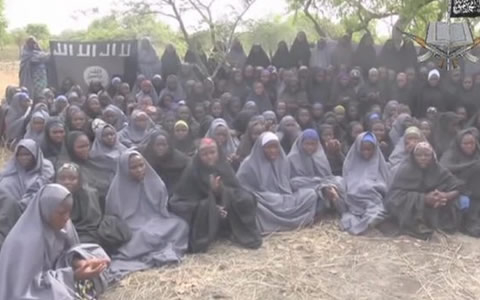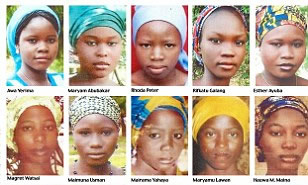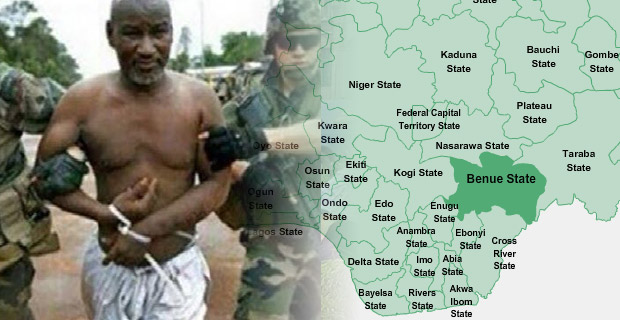Abducted girls: Not all girls in video were taken in April 14 raid, some relatives say
- Posted on
- Comment
 Who are the girls in that Boko Haram video?
Who are the girls in that Boko Haram video?
The local governor says they’re all from the Chibok boarding school raided by Boko Haram militants April 14. But some relatives say they don’t see their daughters in the video, and believe some of the girls were taken in earlier abductions.
A spokesman for the Borno governor said parents, students and teachers have now identified 77 of the girls shown in the video, released Monday by Agence France-Presse, a French news agency.
“Remember, I also said that on face value, all the girls in the video are believed to part of the abducted girls, but Governor (Kashim) Shettima has insisted that the names of all the girls in the video be established and compared with school and security records,” spokesman Isa Gusau said Tuesday.
“The comparison will be done tomorrow as (the) identification exercise continues through the night until every person in that video is named,” said Gusau.
Earlier, Shettima had said that relatives had identified just 54 of the girls. Shettima said he met with families of the kidnapped girls earlier Tuesday in Borno state’s capital, Maiduguri, at which time the families identified some of their girls.
Shettima said the others also attended the school, but he did not explain how he knew that.
CNN has not yet received confirmation from any parents that their daughters were among the girls shown in the video.
Some relatives also told CNN that more than 50 parents of girls abducted last month watched the videos in the Mbalala district and also in Chibok, and didn’t see any of their daughters in the crowd.
That’s not necessarily surprising — the video shows about 100 girls, not the full 276 abducted from Chibok by Boko Haram.
But the relatives interviewed by CNN — an uncle of one of the girls who escaped and the parents of two missing girls — said they believe the video also shows some girls abducted as much as two years ago.
The confusion is significant because the video had been hailed as proof that at least some girls in the Chibok abduction — the object of international search efforts — were alive and well. Such proof would be a crucial part of any possible negotiations that could lead to the release of the girls.
“I think we’ve got to be realistic,” CNN analyst Frances Townsend said Tuesday on “New Day.” “Even in a negotiation, because of the large number of captives, you are unlikely to return all approximately 300 girls to their families and reunite them healthy, safe and well.”
Questions remain
Negotiate or fight?
Shehu Sani, a former negotiator between Boko Haram and the government, has called for Nigerian authorities to negotiate with the girls’ Islamist captors, and he said they may have to embrace the unpalatable option of a prisoner swap.
“There are two ways to which you can get these girls free,” Sani told CNN’s “Connect the World” show.
“The first is to use force, and the second is through dialogue. The use of force is not an option for now in the sense that nobody knows where these girls were kept.
“And even if you know, these girls have been embedded in with the insurgents who are heavily armed. And any attempt to rescue them will be putting their lives in further danger.”
The director of a Nigerian government information ministry, the National Orientation Agency, said all options, including negotiations, are under consideration.
The Nigerian government has negotiated with Boko Haram for the release of kidnapped girls before, CNN terrorism analyst Paul Cruickshank said.
Last year, the militant group won the release of some 100 of its imprisoned members after reaching an agreement to return about a dozen kidnapped girls, Cruickshank said.
Girls’ lives ‘more important’
Cruickshank warned that dealing with Boko Haram will just invite more such abductions, but Sani, a human rights activist in northern Nigeria, said authorities have little choice.
“I believe that the lives of these girls is more important to us than the insurgents that have been in detention. And we have nothing to lose if we send the insurgents and we can swap them with these girls back,” he said.
The man purporting to be Boko Haram leader Abubakar Shekau appeared to open the door to such a resolution.
“By Allah, these girls will not leave our hands until you release our brothers in your prison,” he said.
If not, they’ll be sold as slaves, he said.
Rights groups have accused Nigeria of using heavy-handed tactics such as illegal searches, torture and extrajudicial killings to crack down on the militants.
Military response to allegations
Amnesty International said last week that Nigerian military commanders failed to act on advance warnings about the terror group’s raid on the school.
On Tuesday, Maj. Gen. Chris Olukolade, a spokesman for the Nigerian military, said authorities often are warned of likely attacks on towns and villages.
“In a day, you can have up to 1,000 of such claims. More than three quarters of it turns out to be frivolous,” he said, stressing that no warning has ever been ignored.
“In the case of Chibok, the first one that was taken to be credible was one that came for our troops on patrol who (were) noticing what was going on and observing that it was getting much beyond their level (and) sent for reinforcement,” the spokesman said.
Olukolade also addressed why some people in Chibok, feeling abandoned by the government, have taken security into their own hands and started night patrols.
“One element in this operation has been to cooperate with the locals,” said Olukolade, defending the military against those who say it’s not doing enough.
International assistance
U.S. and British officials are working with the Nigerian government to gather intelligence and decide what to do next.
The United States is flying manned military surveillance flights over Nigeria in the hunt for the girls and their captors, Pentagon spokesman Col. Steve Warren told reporters Tuesday.
It is also sharing commercial satellite images with Nigeria, two senior Obama administration officials told CNN’s Elise Labott.
China and France are helping in the search as well. Israel plans to send a team of counterterrorism experts to help, Nigerian President Goodluck Jonathan’s office said this week.
-CNN








 (Selorm) |
(Selorm) |  (Nana Kwesi)
(Nana Kwesi)